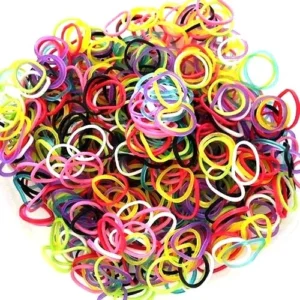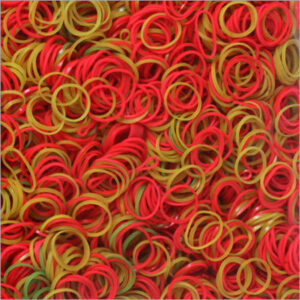Introduction to Direct Wholesale Purchasing
Direct wholesale purchasing is a strategic approach that businesses utilize to acquire products directly from manufacturers rather than going through intermediaries or distributors. This method is particularly advantageous for those interested in sourcing bulk items like rubber bands. As a result, companies looking to enhance their bottom line should consider the implications and advantages associated with directly purchasing rubber bands from wholesale rubber bands manufacturers.
One of the primary benefits of this purchasing model is cost reduction. By eliminating middle agents in the supply chain, businesses can secure better prices on rubber bands, which ultimately leads to lower overall procurement costs. This significant price advantage positively influences profit margins, allowing companies to maintain competitive pricing while maximizing profits. Furthermore, establishing a direct relationship with a wholesale rubber bands manufacturer can often lead to additional discounts or favorable contract terms, especially for bulk purchases.
In addition to financial benefits, direct wholesale purchasing offers a greater understanding of product quality. When buying directly from a manufacturer, businesses can more effectively assess the quality of rubber bands, ensuring they meet specific standards. This understanding is critical for distributors in India looking to maintain customer satisfaction while minimizing returns or complaints due to subpar products. Additionally, direct interactions with manufacturers open avenues for customization, enabling businesses to request modifications that better suit their customer needs.
Overall, direct wholesale purchasing represents a valuable strategy for companies seeking to maximize profits in a competitive market. By engaging with rubber bands for distributors in India, businesses can leverage the benefits of cost savings and product knowledge, thereby fostering greater operational efficiency and enhancing profit potential in their operations. This lays a robust foundation for pursuing effective wholesale strategies in the long term.
Understanding the Rubber Band Market
The rubber band market is a dynamic landscape characterized by varying types of products and diverse consumer demands. Rubber bands are widely used across different sectors, including manufacturing, packaging, and retail. As a versatile product, their applications range from organizing documents to bundling products, highlighting their importance in day-to-day operations for many businesses. Understanding the different types of rubber bands available is essential for any wholesaler or distributor, particularly for those targeting the Indian market.
There are several types of rubber bands available in the market, each tailored for specific uses. For instance, industrial rubber bands tend to be larger and more durable, catering to heavy-duty applications, while smaller, thinner bands are often used in personal or office settings. Additionally, rubber bands can be categorized based on their thickness, elasticity, and lengths, further adding to the diversity in this market. Recognizing these distinctions is crucial for wholesale rubber bands manufacturers and distributors seeking to cater to varied customer preferences.
The demand for rubber bands, particularly in India, is influenced by numerous factors, including economic growth, technological advancements, and changing consumer behaviors. As industries expand and evolve, the need for reliable and high-quality rubber bands grows proportionately. Key players in this sector include both local manufacturers and international suppliers, who strive to meet the needs of their clients while adhering to stringent quality standards. Understanding who the leading manufacturers and distributors are can provide valuable insights into market trends and enable businesses to forge beneficial partnerships.
Additionally, consumer behaviors are shifting towards sustainability and eco-friendly products, leading to an increased interest in biodegradable rubber bands. In a market where responsiveness to trends can translate into competitive advantages, staying informed about consumer expectations and industry innovations is paramount for wholesale rubber bands manufacturers and distributors in India.
Choosing the Right Manufacturer
When entering the wholesale rubber bands market, selecting a trustworthy rubber bands manufacturer is paramount to ensuring a successful partnership and maximizing your profits. A comprehensive evaluation of several key aspects can facilitate this decision-making process.
Firstly, consider the manufacturer’s reputation within the industry. Research online reviews, testimonials, and case studies from previous clients. A well-established manufacturer with a positive track record is more likely to deliver consistent quality and reliability. Engaging with suppliers that have a history of serving rubber bands for distributors in India or global markets may provide additional insights into their operational standards.
Production capacity is another crucial factor. Understanding whether the manufacturer can meet your order volumes consistently is vital for maintaining inventory levels and fulfilling customer demand. Ask potential manufacturers about their production techniques, machinery, and workforce to gauge their ability to scale as your business grows.
Quality control measures cannot be overlooked. Ensure that the manufacturer adheres to stringent quality assurance protocols, such as regular testing of rubber bands for elasticity and durability. Request documentation on their quality control practices and any relevant certifications. Such measures indicate a manufacturer’s commitment to providing high-quality products, which is essential for maintaining your retailer’s reputation.
Finally, an assessment of pricing structures is essential for budget planning. Obtain quotes from multiple manufacturers and compare these in relation to the quality of goods offered. Look for flexibility in pricing and terms, as the ability to negotiate can lead to more favorable agreements. Do not hesitate to ask for samples as a baseline for evaluating quality versus cost effectively.
In conclusion, selecting the right wholesale rubber bands manufacturer requires thorough research and evaluation of their reputation, production capacity, quality control measures, and pricing structures. Forming beneficial partnerships with reliable suppliers can significantly enhance your business’s profitability.
Calculating Costs and Establishing Pricing Strategies
When engaging with a wholesale rubber bands manufacturer, it is crucial to accurately calculate the total costs associated with purchasing rubber bands. This includes not only the cost of the merchandise itself but also additional expenditures such as shipping, handling, and potential import duties for distributors operating in India. Understanding the complete cost structure will allow businesses to set competitive yet profitable pricing strategies.
Initially, assess the base price per unit of rubber bands. This price can vary depending on factors such as quantity ordered and specific agreements with the manufacturer. Subsequently, add shipping costs, which can differ based on shipping method and distance. For businesses importing rubber bands for distributors in India, it is vital to account for customs fees and taxes, which can significantly affect overall spending. By summing these costs, you can derive the total expenditure for your purchase.
Once you have a comprehensive understanding of your costs, developing an effective pricing strategy becomes essential. Setting prices too low may lead to losses, while excessively high prices could deter customers. A common approach is to use a cost-plus pricing strategy, where a standard markup is added to the total cost to determine the sale price. This methodology ensures that all expenses are covered while still providing a margin for profit.
Additionally, consider the competitive landscape. Research prices offered by competitors in the marketplace to find an optimal price point. Offering bulk purchase discounts can also incentivize larger orders, effectively increasing overall sales volume. By effectively managing costs and strategically establishing prices, businesses can enhance profitability — ultimately supporting the goal of becoming a preferred supplier of rubber bands for distributors in India.
Importance of Quality Control
In the competitive landscape of the rubber bands market, quality control is paramount for both manufacturers and distributors. Ensuring that rubber bands meet stringent quality standards is not merely an operational necessity but a strategic imperative. When distributors source rubber bands from a wholesale rubber bands manufacturer, the expectation is that the products will adhere to certain performance characteristics, including elasticity, durability, and consistency. Poor quality rubber bands can lead to product failures, resulting in customer dissatisfaction, which directly impacts sales and profit margins.
To mitigate the risks associated with low-quality products, it is essential for distributors in India to establish clear quality standards before engaging with suppliers. This can involve creating detailed specifications for the rubber bands, outlining criteria such as tensile strength, color precision, and packaging integrity. Additionally, periodic inspections during the manufacturing process are crucial. These inspections help identify any deviations from the desired quality, allowing for corrective measures to be implemented swiftly. Regular communication with the wholesale rubber bands manufacturer during this phase can yield insights into their manufacturing techniques and quality assurance practices.
Another practical approach is to ask for product samples and conduct thorough testing in real-world applications to assess the durability and performance of different rubber bands for distributors in India. This preemptive evaluation can help in selecting the right suppliers who consistently meet quality thresholds. Furthermore, building a long-term relationship with trusted manufacturers can enhance reliability in securing high-quality rubber bands. In conclusion, by prioritizing quality control, distributors not only foster customer satisfaction but also enhance their brand reputation, thus maximizing profitability in an increasingly crowded marketplace.
Effective Marketing Techniques for Rubber Bands
In today’s competitive marketplace, effective marketing strategies are essential for wholesalers looking to promote their products, including rubber bands. To maximize visibility and reach, it is vital to implement a blend of both online and offline marketing techniques tailored for the specific needs of distributors. The primary focus should be on recognizing the target audience—such as retailers and other businesses that require supplies of rubber bands.
One of the most effective online marketing techniques is leveraging social media platforms to engage directly with potential clients. By creating visually appealing content that showcases the various uses of rubber bands, manufacturers can attract distributors seeking unique products. Paid advertising campaigns on platforms like Facebook and Instagram can also help in targeting specific demographics, providing the opportunity to highlight special promotions or new product launches.
Search Engine Optimization (SEO) also plays a crucial role in boosting online visibility for a wholesale rubber bands manufacturer. By ensuring that the company’s website is optimized for search engines, marketers can increase organic traffic. Utilizing keywords such as “rubber bands for distributors India” throughout the website will enhance discoverability. Regular blog posts or articles related to the use of rubber bands in various industries can create authority and drive interest in the manufacturer’s offerings.
Offline marketing strategies remain just as important in promoting rubber band products. Attending trade shows allows manufacturers to showcase their products and network with potential customers. Setting up an eye-catching booth and providing samples of rubber bands can entice distributors. Additionally, traditional marketing methods such as flyers, brochures, and direct mail can be tailored to the specific industries that frequently utilize rubber bands, thereby effectively reaching a targeted audience.
By integrating both online and offline marketing techniques, wholesale rubber bands manufacturers can successfully elevate their market presence and drive sales among distributors. Implementing these strategies ensures a comprehensive approach to marketing, ultimately leading to increased profitability.
Distribution Channels and Selling Platforms
In today’s competitive market, understanding distribution channels and selling platforms is crucial for maximizing profits as a wholesale rubber bands manufacturer. Various avenues are available for selling rubber bands, which include e-commerce platforms, bulk selling to retailers, and direct sales to consumers. Each of these channels presents unique advantages and challenges, making careful consideration essential for distributors and manufacturers alike.
E-commerce platforms, such as Amazon and eBay, have gained tremendous popularity for selling rubber bands, particularly for distributors in India looking to reach wider audiences. These platforms offer a user-friendly environment that allows for easy listing and promotion of products. Additionally, they provide access to a vast pool of potential customers. However, the competition on these platforms can be intense, and associated fees may eat into profit margins. Brands need to invest in high-quality listings and marketing strategies to stand out from numerous sellers.
On the other hand, bulk selling to retailers can be advantageous for wholesale rubber bands manufacturers seeking more stable, long-term contracts. This approach fosters strong relationships with retailers who may distribute rubber bands in their stores. While this method can generate significant orders, it requires manufacturers to maintain consistent quality and pricing, as well as adherence to the retailer’s inventory and promotional guidelines.
Direct sales to consumers represent another viable channel. By leveraging social media and targeted online advertising, manufacturers can promote their products directly to end-users. This method increases profit margins by eliminating middlemen, but it necessitates substantial effort in customer engagement and brand building. Sales strategies, such as offering discounts on bulk orders, can enhance appeal and encourage repeat purchases.
Each of these distribution channels has its distinct set of benefits and challenges. By carefully weighing these factors and selecting the appropriate mix for selling rubber bands, manufacturers and distributors can maximize their reach and drive profits effectively.
Building Strong Customer Relationships
In the wholesale rubber band industry, cultivating robust relationships with customers is crucial for sustained profitability and growth. The significance of customer relationship management cannot be overstated, as it fosters loyalty and encourages repeat business. Establishing a reliable rapport with clients not only enhances customer satisfaction but also strengthens the likelihood of referrals, a key driver of revenue for many wholesale rubber bands manufacturers.
Communication plays a pivotal role in nurturing these relationships. Regular interaction with both customers and suppliers ensures that expectations are clearly set and met. For rubber bands for distributors in India, this might involve proactive engagement through updates on new product lines, pricing changes, or inventory availability. Utilizing various communication channels—such as email, phone calls, and even social media—can help maintain a constant presence in the market and demonstrate a commitment to customer satisfaction.
Reliability is another cornerstone of successful customer relationships. Customers seek suppliers who consistently deliver quality products on time. As wholesale rubber bands manufacturers, establishing a track record of dependability can significantly heighten trust among distributors and retailers. This reliability extends beyond product quality to include transparency in transactions and the ability to address and resolve issues promptly. Cultivating an environment of trust leads to stronger ties with clients, which are invaluable when exploring growth opportunities.
Lastly, providing excellent service is fundamental in setting a business apart from its competitors. This includes training employees to be knowledgeable about the products, offering flexible pricing options, and ensuring efficient order fulfillment. When customers receive exceptional service, they are likely to remain loyal to a particular wholesale rubber bands manufacturer, fostering a healthy cycle of repeat business and potent word-of-mouth advertising.
In conclusion, building strong customer relationships in the wholesale rubber band sector is essential for ongoing success. By focusing on effective communication, reliability, and superior service quality, businesses can not only improve customer retention but also enhance their market presence.
Case Studies of Successful Wholesale Rubber Band Businesses
Several businesses have successfully navigated the dynamics of the wholesale rubber band market, leveraging direct purchases from a wholesale rubber bands manufacturer to amplify their profits. These case studies reveal valuable strategies, the challenges encountered, and the solutions implemented to boost revenue.
One notable example is a distribution company in India specializing in office supplies. This business recognized that directly sourcing rubber bands for distributors in India from manufacturers allowed them to reduce costs significantly. By establishing a direct relationship with a wholesale rubber bands manufacturer, they negotiated favorable terms, including bulk pricing and exclusive access to new products. This strategy not only reduced overhead costs but also ensured a consistent supply of high-quality rubber bands, enabling them to meet customer demand efficiently.
Another case involves a small crafting business that used direct purchasing to its advantage. Initially obtaining rubber bands through local retailers, the business faced higher costs and inconsistent quality. By shifting to direct orders from a wholesale rubber bands manufacturer, the company reduced its costs by 30%. Moreover, they implemented a strategy of differentiation by offering specialty rubber bands in unique colors and sizes, sourced directly from manufacturers. This move attracted a niche market and provided a competitive edge in a saturated marketplace.
Challenges faced by these businesses included fluctuations in demand and inventory management. To address these, companies adopted agile inventory practices—such as utilizing just-in-time ordering systems and maintaining strong relationships with suppliers to balance stock levels effectively. The integration of these practices not only mitigated risks but also enhanced their operational efficiencies.
In conclusion, the case studies highlight how adopting direct purchases from a wholesale rubber bands manufacturer can lead to substantial cost savings and increased profitability. By learning from these businesses, others can formulate strategies to maximize their own profit margins while navigating the complexities of the rubber band market.







